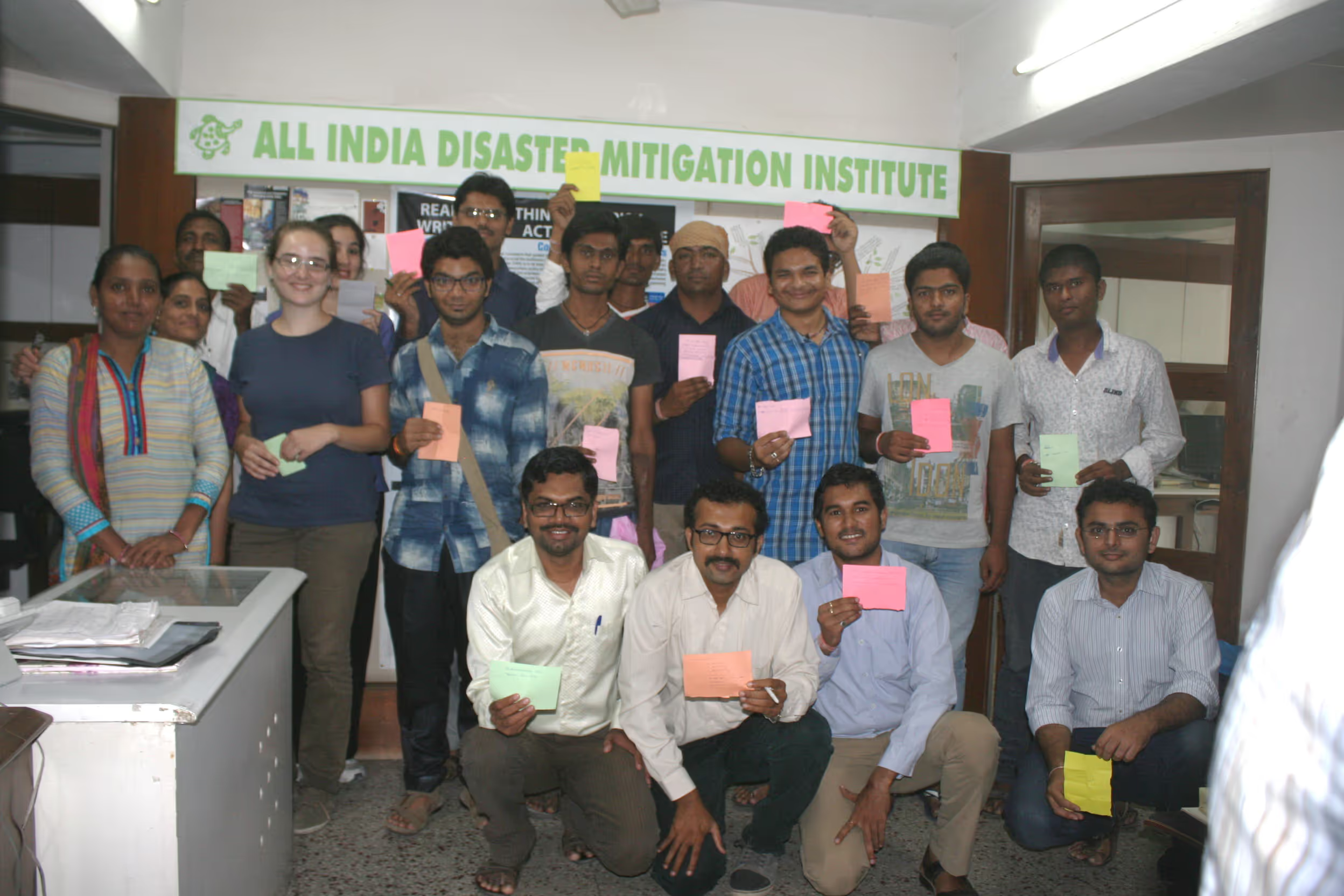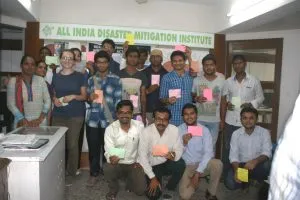Small and Informal Businesses Collaborate World Humanitarian Day at AIDMI

The All India Disaster Mitigation Institute (AIDMI) celebrated the World Humanitarian Day on 19th August, 2015 with some small and informal business owners from Ahmedabad. Since 2009, World Humanitarian Day is celebrated throughout the world to commemorate those people who have lost their lives in humanitarian service and those who continue to bring assistance and relief to millions. This year the theme of the World Humanitarian Day was “Inspiring the World’s Humanity.’ This theme calls people to celebrate the spirit of humanitarian work by spreading awareness about humanitarianism.NEW_LINENEW_LINESmall businesses suffer significant losses, sometimes to the point of elimination, after a humanitarian crisis. At the same time, small and informal businesses play an active role in reviving livelihoods, markets and a sense of community after a crisis. All these roles are inspiring, but under-recognized and these victims remain largely unsupported in international humanitarian action worldwide.NEW_LINENEW_LINETaking a leaf out of this year’s theme, AIDMI joined to celebrate the World Humanitarian Day with a unique group of youths familiar with small and informal businesses. These youngsters came mainly from three categories, humanitarian workers, students from higher education, and those who had dropped out of school for one reason or the other, but are now pursuing their education through non-traditional systems such as the National Institute of Open Schooling (NIOS). It was decided to introduce such youngsters to the different aspects of humanitarianism through humanitarian efforts in the field of disaster risk reduction and later on humanitarian innovation via risk transfer through mircoinsurance for small and informal businesses.NEW_LINENEW_LINE

The celebration started with a presentation which gave the group an insight into the background and different aspects of humanitarian work worldwide. This was followed by an interactive session where the presenters informed the group about the daily humanitarian work which people often undertake without even knowing it.NEW_LINENEW_LINEThe next part of the celebration consisted of spreading awareness about ‘Innovating Disaster Microinsurance for Local Market Recovery’, a collaborative project between AIDMI, Stanford University and the Humanitarian Innovation Fund (HIF). The presenters stressed the humanitarian aspects of this project, which tries to address the post disaster financial needs of small and informal businesses. “Humanitarian action is not humanitarian if it leaves the recovering victims exposed to more and future risks”, said Mihir R. Bhatt of AIDMI.NEW_LINENEW_LINEDue to poverty, illiteracy and other debilitating factors, these small business owners often do not get their businesses registered with the concerned authorities. As a result, they are left out of the ambit of any government policies and schemes which seek to promote business recovery in post-disaster situations. Disasters or extreme events are often the greatest threat faced by such businesses.NEW_LINEThus, many small and informal businesses face closure after a disaster or extreme event. Risk transfer approaches in the form of disaster microinsurance seem to be a feasible solution to the problem of continuity and recovery of small and informal businesses in post-disaster situations.NEW_LINENEW_LINEThe presenters stressed that the project “Innovating Disaster Microinsurance for Local Market Recovery” aims to do just that. The project is supported by the Humanitarian Innovation Fund. The need for a disaster microinsurance product for small and informal businesses was also highlighted through the following points:NEW_LINENEW_LINE• Small informal businesses are repeatedly exposed to disaster risks.NEW_LINE• Employment in the non-agriculture informal sector is close to 59% in urban areas of India.NEW_LINE• Loss assessments often ignores the loss of the informal sector, compensation takes too long and is often below market rates.NEW_LINE• Microinsurance can break the cycle of poverty by providing low income households access to post disaster liquidity.NEW_LINE• Currently it is mostly the “victims” who manage the majority of disaster recovery themselves. Microinsurance can help accelerate their efforts.NEW_LINE• The informal sector is restricted in its access to vital financial services such as microinsurance.NEW_LINENEW_LINEAfter briefing the group of participants about the needs of disaster microinsurance, the presenters related the progress of the project. The data from the demand surveys of small businesses from 3 urban locations – Guwahati in Assam, Cuddalore in Tamil Nadu and Puri in Odisha - have been collated and analyzed for designing an appropriate insurance scheme. The final disaster microinsurance policy will be designed through stakeholder consultations that would synthesize the findings of the aforementioned demand survey with the suggestions of all the involved stakeholders. The final policy will be introduced to potential clients after these consultative procedures.NEW_LINENEW_LINEThe proceedings of the day ended with an interactive session between the presenters and the group of youngsters. The participants shared their views on how to better communicate the findings of this project through the use of social media platforms like facebook and WhatsApp. They vowed to spread the word about the spirit of humanitarianism among their friends too.
Stay updated
Sign up for our newsletter to receive regular updates on resources, news, and insights like this. Don’t miss out on important information that can help you stay informed and engaged.
Related articles


.png)
Explore Elrha
Learn more about our mission, the organisations we support, and the resources we provide to drive research and innovation in humanitarian response.